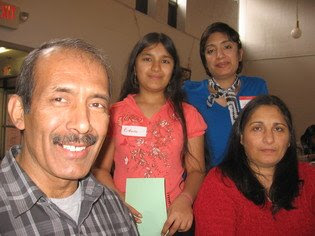I have contacted Pare
Gerou, who works with refugees through the University of Virginia in
Charlottesville, Virginia. Though much of her time is spent with the legal side of refugee issues, she has gotten to know many refugees extremely well. She has encountered refugees with various disorders and has first-hand knowledge of how these can affect a refugee's ability to cope with change and life in a new society. I have asked her so many questions, below is an
excerpt from her responses:
1. What kinds of psychological disorders have you encountered with the refugees you have worked with? Just about everything.
PTSD is the disorder people like to talk about most, but depending on the population (
ethnicity, nationality, sex, etc) they experiencing a whole panoply of disorders. Here is the website to one of the best clinics in the country for refugees and
asylees who are
experiencing trauma and other psychological disorders (
Bellvue Hospital Program for survivors of Torture)--
http://lib.bioinfo.pl/pmid:16534436. As you can see, this is a link to the documents discussing the psychological traumas. New York University has a clinic that works with
Bellvue, and here is their website-
http://www.survivorsoftorture.org/what_interpart.html. You can go to their website if you want to research the types of services provided to victims of torture in a larger urban center.
2. How do their disorders affect their ability to live in a new environment and adapt to a society different from their own? The transition can be incredibly difficult for refugees and
asylees who have experienced trauma. Focusing on a particular refugee population and talking about their particular adjustment problems will be the easiest way to tackle this issue. New York University has a refugee clinic that works with
Bellvue Hospital. Their website has information about Ugandan child soldiers who have been resettled in the United States--
http://www.survivorsoftorture.org/what_interpart.html. The “Multicultural Human Services” program in Washington DC provides services to resettled refugees, and they are very approachable. You can call them and ask them a few questions if you like--
http://www.nvfs.org/3. Stories--*I have had a client who was charged with beating her young son. She was Bosnian, had been raped repeatedly, and her husband had been killed by Serbs.
*I have a Tibetan client who was imprisoned by Chinese for 10 years and tortured. Although I brought his wife over to
Charlottesville, he spends most of his time working alone in New York where he can earn more money and is extremely antisocial— cannot bond with relatives or wife anymore.
*I have a
Vietnamese manto who was imprisoned and tortured for 10 years. He has been unable to learn English and communicate much although he is clearly quite young and bright.
*I have Sudanese children who never take part in any play at all and merely stare at the children from the sidelines.
*I have a couple who divorced because he was having violent episodes. He was imprisoned and then shot in the leg while fighting.
 ey come to America. I have learned there is basically no government organized system specifically to help with these idorders among refugees. Only if there exist extremely noticable issues will a refugee get help. Many don't go through any sort of support program, whether it has an emphasis on basic survival or monetary help or anything at all. Right now charitys, such as church groups and not-for-profit groups, and university clinics, are the only places that offer refugees help. That needs to change.
ey come to America. I have learned there is basically no government organized system specifically to help with these idorders among refugees. Only if there exist extremely noticable issues will a refugee get help. Many don't go through any sort of support program, whether it has an emphasis on basic survival or monetary help or anything at all. Right now charitys, such as church groups and not-for-profit groups, and university clinics, are the only places that offer refugees help. That needs to change. ey come to America. I have learned there is basically no government organized system specifically to help with these idorders among refugees. Only if there exist extremely noticable issues will a refugee get help. Many don't go through any sort of support program, whether it has an emphasis on basic survival or monetary help or anything at all. Right now charitys, such as church groups and not-for-profit groups, and university clinics, are the only places that offer refugees help. That needs to change.
ey come to America. I have learned there is basically no government organized system specifically to help with these idorders among refugees. Only if there exist extremely noticable issues will a refugee get help. Many don't go through any sort of support program, whether it has an emphasis on basic survival or monetary help or anything at all. Right now charitys, such as church groups and not-for-profit groups, and university clinics, are the only places that offer refugees help. That needs to change.
